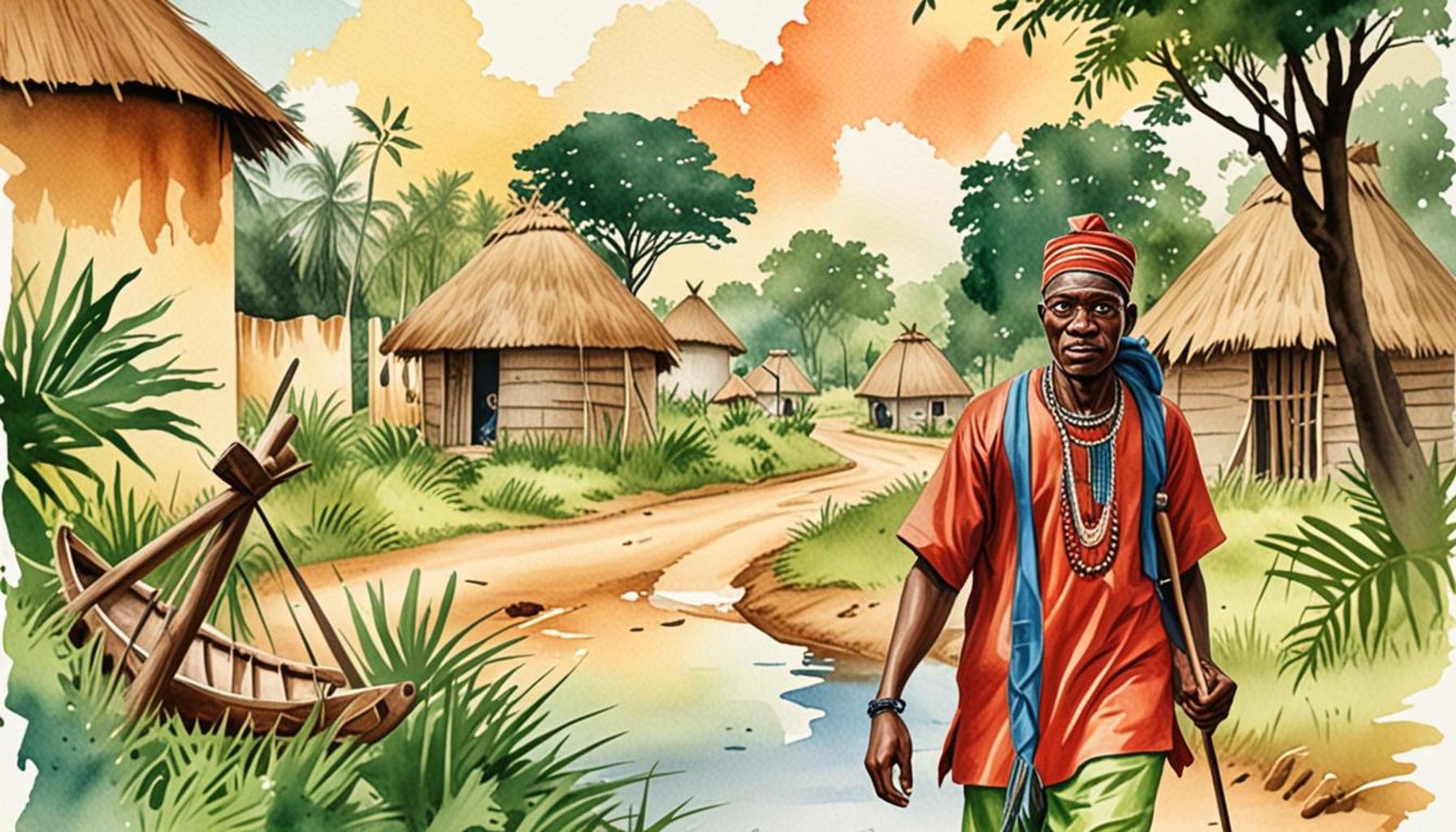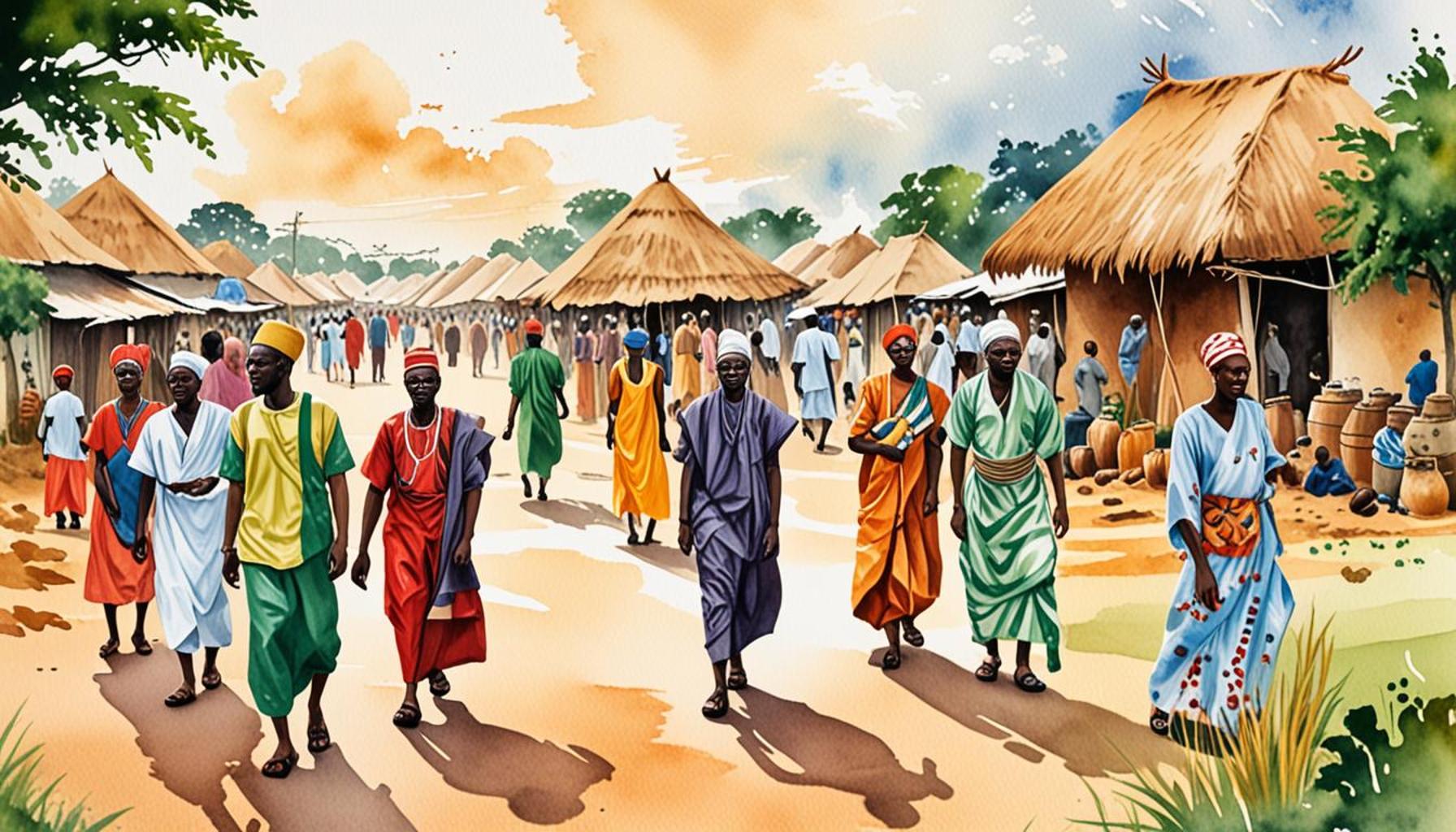Discovering Heritage Routes: Paths that Tell the History of Indigenous Peoples of Nigeria

Exploring Nigeria’s Heritage Routes
The intricate tapestry of Nigeria’s history is vividly displayed through its heritage routes, each offering a captivating glimpse into the life and traditions of its numerous indigenous peoples. As travelers immerse themselves in these pathways, they uncover the essence of a diverse culture that has thrived for centuries. Each route is not merely a passage but essentially a narrative recounting tales of resilience, cultural pride, and the unwavering spirit of the Nigerian populace.
The Ancient Towns
One of the most compelling aspects of Nigeria’s heritage is its ancient towns, each uniquely embodying the rich architectural and cultural significance of its people. Consider Benin City, which was once the center of the powerful Benin Kingdom. The city is adorned with intricate bronze sculptures and remains of massive walls that symbolize its historical prowess. Meanwhile, the ancient city of Oyo, home to the famous Oyo Empire, boasts historic sites such as the Alaafin’s Palace, which offers insights into the authority and governance that shaped this influential kingdom.
Significant Landmarks
Landmarks such as Olumo Rock in Abeokuta are not just scenic vistas; they are steeped in history and myth. According to local beliefs, the rock served as a refuge for the Egba people during times of war. Similarly, the ancient Nok sites in Northern Nigeria, known for their remarkable terracotta sculptures, showcase the early technological prowess of the Nok culture, dating back to as early as 1000 BC. These sites not only highlight the artistic skills of the civilization but also signify one of Africa’s earliest known societies.
Cultural Festivals
Delving into Nigeria’s heritage would be incomplete without experiencing its vibrant cultural festivals. The Osun-Osogbo Festival, for instance, is a grand celebration of the Osun River goddess, attracting thousands every year. Participants engage in rituals and dance, emphasizing the connection to ancestry and spiritual beliefs. The Ekpo Festival, celebrated by the Efik people, serves as a ceremonial event marking the transition of society and honoring ancestors through elaborate masquerades and traditional music. These celebrations not only captivate the senses but also embody the deep reverence the people have for their lineage and traditions.
As you embark on these extraordinary heritage routes, you will encounter local artisans displaying their craftsmanship, musicians sharing traditional songs that echo the tales of old, and chefs serving mouthwatering dishes that reflect the land’s bounty. This journey through Nigeria’s cultural corridors is rich with opportunities to learn, engage, and appreciate the vibrant present while honoring the profound past. It’s an invitation to explore the essence of Nigeria, intricately woven into both its landscape and its warm-hearted people.
SEE ALSO: Click here to read another article
Unearthing the Rich Narratives
Nigeria’s heritage routes are not just physical pathways; they are time-honored trails that lead to a deeper understanding of the country’s indigenous peoples. Each step taken along these routes reveals the vibrant stories that have shaped the cultural landscape of this diverse nation. From the ancient kingdoms to the colonial resistances, these paths serve as living museums of heritage, inviting both locals and visitors to engage with Nigeria’s multifaceted narratives.
The Northern Trails
The northern region of Nigeria, characterized by its ancient civilizations and beautiful landscapes, offers a unique glimpse into the heritage of indigenous groups such as the Hausa-Fulani. The historic city of Sokoto is a testament to a rich Islamic heritage, marked by the Sokoto Caliphate, which was founded in the early 19th century by Usman dan Fodio. The caliphate’s influence is still palpable today through its traditional governance and cultural practices.
As you traverse the northern routes, landmarks like the ancient city of Kano come alive with stories of trade and commerce. The Kano Emirate, known for its lavish durbar celebrations, reveals the importance of royalty and cultural identity among the Hausa people. Visitors can explore the striking Kano City Walls, which date back to the 15th century, serving as a powerful reminder of the city’s historical significance and defense against intruders.
Glimpses into Southern Culture
In Southern Nigeria, heritage routes lead travelers through an array of vibrant communities rich in tradition. The Igbo people, known for their excellence in arts and craftsmanship, showcase their heritage through colorful markets and ancient practices. Events such as the Ibo Festival celebrate the harvesting of yams and provide insights into their agrarian culture, emphasizing the close relationship between the people and their environment.
Additionally, the Yoruba culture is deeply embedded along the southwestern routes, particularly in towns like Ifé and Ogun. Ifé is revered as the cradle of Yoruba civilization, famed for its historical significance and artistic prowess, particularly the famous Ife terracotta sculptures. These artifacts provide a fascinating glimpse into the skilled craftsmanship of the Yoruba civilization, illustrating the advanced societal structures that existed centuries ago.
Routes to Cultural Connection
Engaging in these heritage routes allows visitors to embrace Nigeria’s rich and diverse cultures while fostering connections with the communities. Here are several experiences that illuminate the history of indigenous peoples:
- Exploring ancient artifacts at museums showcasing the legacies of various tribes.
- Participating in traditional ceremonies that provide insight into the spiritual beliefs of indigenous groups.
- Tasting indigenous dishes that reflect the gastronomical diversity across regions.
- Meeting local historians and elders who share oral histories and traditional stories from generations past.
As you embark on this journey through Nigeria’s heritage routes, an array of threads woven from the past will guide you towards a greater understanding of the nation’s roots and cultural legacy. This path of discovery is a testament to the resilience of indigenous peoples and a celebration of their ongoing contributions to Nigeria’s rich tapestry of life.
| Advantage | Description |
|---|---|
| Cultural Awareness | Exploring heritage routes fosters a strong understanding of indigenous customs and traditions. Travelers gain insights into the rich historical tapestry of Nigeria. |
| Economic Growth | Heritage tourism can significantly boost the local economy, creating opportunities for entrepreneurship and ventures that celebrate indigenous culture. |
| Education | These routes serve as living classrooms where visitors and locals alike can learn about the historical impacts and contributions of indigenous peoples. |
| Sustainability | Heritage routes promote sustainable practices by highlighting conservation efforts in preserving history and environment. |
As one investigates the heritage routes of Nigeria, the profound connection between culture and exploration becomes evident. Each path not only tells stories of resilience and tradition but also invites reflection on the intricate ties that bind all Nigerians to their shared history.
SEE ALSO: Click here to read another article
Exploring the Essence of Indigenous Wisdom
The journey along Nigeria’s heritage routes not only showcases the physical remnants of ancient civilizations but also serves to preserve the intangible cultural heritage embedded within Indigenous communities. These paths are living repositories of knowledge, traditions, and languages that have persisted despite the inevitable tide of modernization. By walking these routes, one can witness the enduring spirit of indigenous peoples, from their philosophical beliefs to their storytelling traditions.
Language, the Soul of Culture
Language plays a pivotal role in the identity of Nigeria’s indigenous peoples. Routes such as those taken through the regions home to the Kanuri and Gwari provide insight into how dialects serve not just as a means of communication but as historical narratives. For instance, traditional proverbs and songs passed from generation to generation encapsulate the wisdom and values of the people. The preservation of local languages fosters a connection to their ancestors and rituals, imparting a sense of belonging and community.
In addition to regional dialects, oral history remains a vital means of maintaining cultural continuity. Heritage routes often lead to community gatherings where stories shared by elders paint a vivid picture of the past. Engaging with these tales encourages visitors to appreciate the depth of indigenous knowledge, which includes not only folklore but also lessons on governance, environmental stewardship, and social responsibility.
The Arts: A Reflection of Identity
The artistic expressions found along Nigeria’s heritage routes are indicative of the diverse identities and historical experiences of indigenous peoples. Across the countryside, traditional art forms, including mask-making in the Ijaw regions and beadwork by the Efik people, capture the essence of cultural narratives. The vibrant colors and intricate designs tell stories of ancestral lineage and spiritual beliefs, offering visitors an authentic view into the communities’ ways of life.
Festivals such as the Osun-Osogbo</strong festival in Osun State attract travelers from across the globe, showcasing shrines and artworks dedicated to the river goddess Osun. This annual celebration not only honors the goddess but reinforces the community's unity and connects participants to their ancestry, providing a palpable sense of heritage.
Conservation Along the Pathways
As the realization of the importance of these heritage routes grows, there is an increasing movement towards cultural conservation efforts. Eco-tourism initiatives along these pathways aim to protect not just the physical landscapes, but also the cultural practices and rituals associated with them. This approach empowers local communities, enabling them to celebrate their heritage while sharing it with visitors in a sustainable manner.
- Engaging local artisans in preserving traditional crafts through workshops.
- Promoting responsible tourism that respects cultural sites and Indigenous rights.
- Encouraging educational programs focused on the history and cultural significance of indigenous practices.
- Collaborating with international bodies to secure funding for heritage preservation projects.
Exploring Nigeria’s heritage routes offers a transformative journey for those eager to delve into the indelible mark left by its indigenous peoples. It reveals the intricate connections between the land, the past, and the unique identities shaped along these paths, reminding both visitors and locals that the essence of heritage lies not merely in monuments, but in the living culture that breathes life into history.
CHECK OUT: Click here to explore more
Conclusion: A Journey Worth Taking
The exploration of Nigeria’s heritage routes is not merely a travel itinerary; it is an invitation to connect with the profound stories and traditions of Indigenous peoples across the nation. These pathways encapsulate the essence of rich histories, languages, and cultural practices that have shaped the diverse tapestry of Nigerian identity. By traversing these routes, one experiences firsthand the intimate relationship that Indigenous communities maintain with their land, showcasing their resilience and spirit amidst the swiftly changing modern world.
As the indigenous narratives unfold through oral traditions, languages, and breathtaking art forms, visitors are urged to embrace the philosophy of shared heritage. This journey unlocks layers of understanding regarding social norms, environmental stewardship, and governance practices inherent in the communities along the way. Furthermore, the commitment to cultural conservation highlights the importance of sustainable tourism, ensuring that the legacies of these communities endure for generations to come.
In essence, discovering Nigeria’s heritage routes is a call to foster appreciation and respect for the Indigenous peoples who have long been the stewards of their culture. It compels both locals and international travelers to engage deeply with these routes, championing their stories and practices. Ultimately, through this connection, we cultivate a greater understanding of our shared humanity, reinforcing the value of cultural diversity as a driving force for unity and respect in our global society. The paths await; let this journey illuminate both history and heart.


